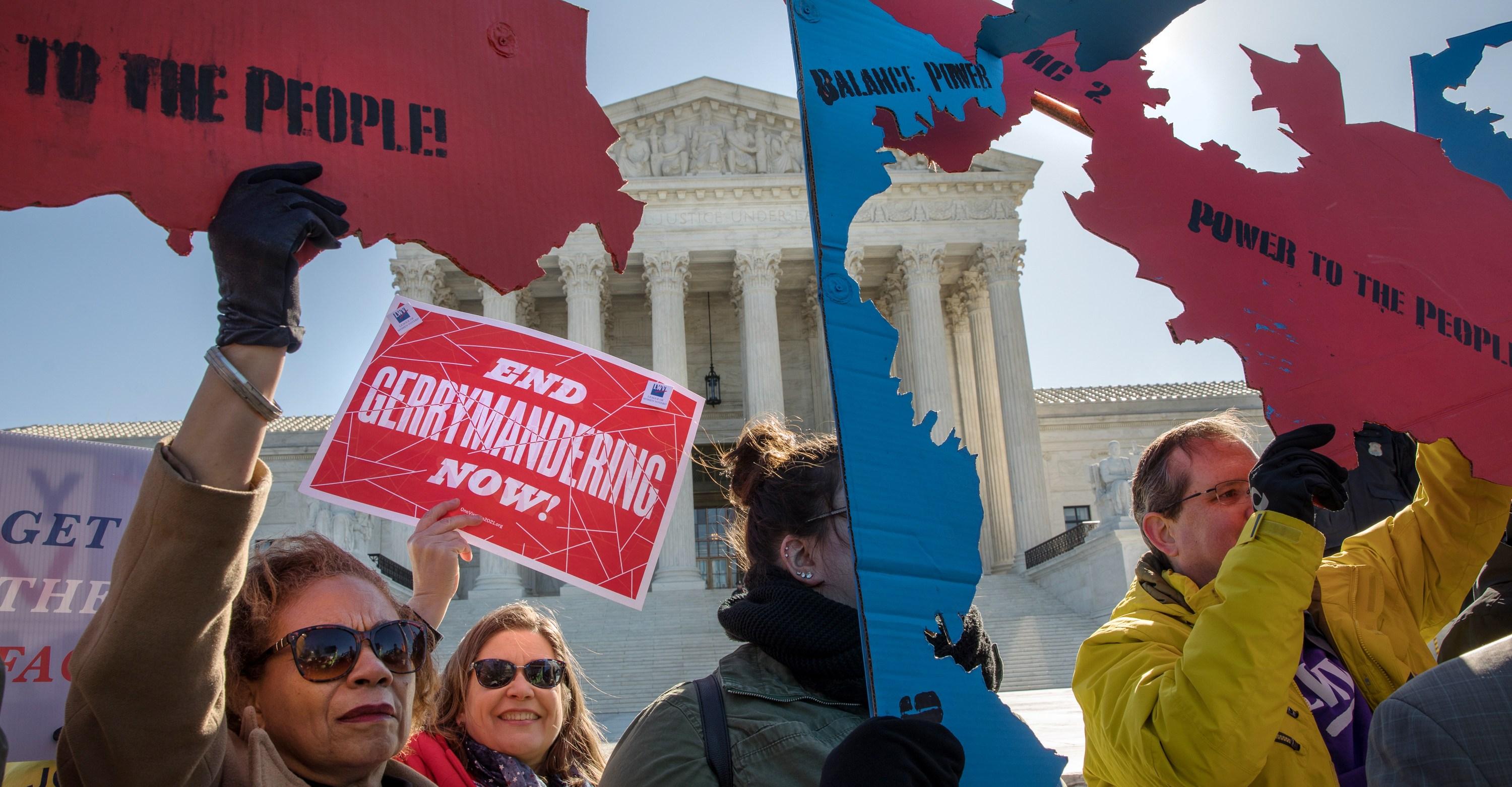The killing of workers for the nonprofit headed by Chef José Andrés show no place in Gaza is safe, even for aid groups.


An Israeli airstrike Monday killed seven aid workers who were delivering food to Palestinians on the brink of widespread famine in Gaza.
The attack — whose victims were almost all foreign citizens and were with World Central Kitchen, the nonprofit run by Spanish American chef and humanitarian José Andrés — has drawn widespread international condemnation and underscored the risks that humanitarian workers take every day in trying to deliver still-insufficient levels of aid to Gaza.
“This is not only an attack against WCK, this is an attack on humanitarian organizations showing up in the most dire of situations where food is being used as a weapon of war,” World Central Kitchen CEO Erin Gore said in a statement. “This is unforgivable.”
The victims, who were wearing bulletproof vests bearing their organization’s logo, were from Australia, Poland, the United Kingdom, Palestine, and the US and Canada. (Israel has acknowledged the incident, which it called an accident, and expressed its “condolences” to the families.)
US President Joe Biden said in a statement Tuesday night that he was “outraged and heartbroken” about their killings.
“Israel has not done enough to protect aid workers trying to deliver desperately needed help to civilians. Incidents like yesterday’s simply should not happen,” Biden said. “Israel has also not done enough to protect civilians. The United States has repeatedly urged Israel to deconflict their military operations against Hamas with humanitarian operations, in order to avoid civilian casualties.”
World Central Kitchen has paused operations in Gaza as a result of the attack, both threatening one of the few sources for food aid in Gaza and highlighting the challenges humanitarian workers are facing as Israel threatens to escalate its assault with an invasion of the southern city of Rafah and continues to obstruct the delivery of aid.
According to the Aid Worker Security database, 260 aid workers were killed across Gaza and the West Bank last year and 60 this year so far.
“The attack that happened yesterday isn’t something that happened in isolation. There has been a pattern of attacks against humanitarian aid operations and facilities as well as medical workers and facilities throughout this conflict,” said Ciarán Donnelly, the International Rescue Committee’s senior vice president for crisis, response, recovery, and development.
What we know about the attack
To understand the import of the work of World Central Kitchen and other aid groups right now, you have to understand what’s happening in Gaza: Projections indicate that by July, half of its population will face an entirely avoidable famine — one that has no natural causes and that has accelerated faster than anything else seen this century.
Just weeks ago, World Central Kitchen established a makeshift jetty to facilitate maritime aid deliveries while the US government worked to construct a temporary pier in Gaza.
Though the United Nations delivers about 80 percent of the aid that has been going to Gaza, World Central Kitchen was responsible for more than half of the remaining aid deliveries, primarily food, before Monday’s attack. As of mid-March, the organization had sent 200 tons of food to Gaza.
The nonprofit said it had informed the Israel Defense Forces (IDF) that its team would be traveling in a deconflicted zone in two armored cars branded with its logo and one non-armored vehicle.
Israeli missiles nevertheless struck the convoy three times after it left a warehouse in Deir al-Balah, an area in central Gaza where there is a United Nations refugee camp and where the workers had unloaded more than 100 tons of food aid.
The IDF referred Vox to a video statement by its spokesperson Daniel Hagari when asked why it struck the convoy, what evidence it had to support doing so, and how it would work to facilitate the delivery of more aid to Gaza now that World Central Kitchen is stepping back.
Hagari said in the statement that the IDF was “reviewing the incident at the highest levels” and that he had spoken with Andrés to express condolences. “As a professional military committed to international law, we are committed to examining our operations thoroughly and transparently,” he said. He did not offer details on the decision-making behind the strikes or deny that the IDF knew that it was targeting World Central Kitchen vehicles.
Haaretz reports that its sources say the IDF suspected an armed Hamas operative was traveling in the convoy. That did not turn out to be the case.
In a video statement to the Times of Israel, Israeli Prime Minister Benjamin Netanyahu said in Hebrew, “It was an unintentional hit on innocent civilians. Those things happen in wartime. We are conducting an investigation.”
Secretary of State Antony Blinken said Tuesday in Paris that Biden administration officials had spoken to the Israeli government about the incident.
“We’ve urged a swift, a thorough, an impartial investigation to understand exactly what happened. And as we have throughout this conflict, we’ve impressed upon the Israelis the absolute imperative of doing more to protect innocent civilian lives … as well as to get more humanitarian assistance to more people, more effectively,” he said.
The consequences
In January, the International Court of Justice issued a ruling requiring Israel to step up its efforts to facilitate the delivery of aid to Gaza.
Those efforts have not visibly materialized.
Some critics have raised concerns in the past about World Central Kitchen’s approach to its workers’ safety, which has sometimes involved thrusting them into disaster zones without much preparation. But this strike is emblematic of a larger pattern in Gaza.
In addition to the World Central Kitchen workers, those killed since the start of the war include five staff members for Doctors Without Borders (MSF), an NGO providing health care in Gaza, and 14 on-duty staff members for the Palestinian Red Crescent. Both groups have decades of experience working in war zones.
Humanitarian infrastructure, such as hospitals and refugee camps, has been under continued Israeli bombardment since the start of the war. As of March 1, only 12 of Gaza’s 36 hospitals were even partially functional, and those that were open still suffered from critical shortages of medical supplies. Food infrastructure, such as bakeries and flour mills, has also been destroyed. (The IDF recently withdrew from al-Shifa hospital, alleging it had arrested more than 500 suspected militants, while leaving behind hundreds of bodies and a “trail of destruction,” per CNN.)
Israel has also continued to restrict aid deliveries despite claiming that it does not block aid. Oxfam published a report recently accusing Israel of deliberately doing so, noting that aid trucks must wait an average of 20 days to enter and that Israel has rejected a warehouse’s worth of supplies, including oxygen, incubators, water, and sanitation equipment.
Gaza is “both one of the most dangerous and one of the most restrictive spaces we’ve operated in for quite some time,” said Donnelly, of the International Rescue Committee.
The consequences for the population of Gaza are dire.
Researchers at Johns Hopkins University project that by August, absent a ceasefire, the number of excess deaths in Gaza — including from disease outbreaks — could reach nearly 67,000 if the status quo continues and exceed 85,000 if there’s an escalation in the conflict. And an escalation in Rafah remains possible: Though Israel has agreed to take US concerns about an invasion into account, it’s not yet clear whether it will postpone the offensive or abandon it altogether.
This is prompting allegations that Israel is deliberately using starvation as a weapon of war, which would constitute a war crime. One senior member of Netanyahu’s Likud party has called these allegations “total nonsense” and “irresponsible.” Any such alleged war crimes are difficult to prove and require lengthy litigation; Israel is already facing a case at the International Court of Justice accusing it of committing genocide in Gaza, which won’t be resolved for years.
But what is clear is that Israel’s tactics in Gaza correlate with an abominable death toll, which now exceeds 33,000, and its screening policies for aid deliveries are effectively starving Palestinians. Intentional or not, the consequences are undeniably grim.
Monday’s attack will make it even harder for aid workers to address the deepening disaster. The risks to staff are already proving too high for the United Arab Emirates, which is reportedly ceasing involvement in the maritime aid corridor to Gaza until Israel can assure the safety of its workers.
“The only way to provide safety and aid for Palestinian civilians, the only way to provide space for agencies to operate at the scale that we need to given the severity of the needs, is for the fighting to end,” Donnelly said.
Update, April 3, 9:55 am ET: This story, originally published April 2, has been updated with Biden’s reaction.

Mensah, Duke settle dispute as QB eyes Canes
- 4 hours ago

Dozens of nudify apps found on Google and Apple’s app stores
- 5 hours ago

X faces EU investigation over Grok’s sexualized deepfakes
- 5 hours ago

Astronomers used AI to find 1,400 ‘anomalous objects’ from Hubble archives
- 5 hours ago

Microsoft’s first Windows 11 update of 2026 has been a mess
- 5 hours ago
Pavia vows to show NFL 'what I got' in Senior Bowl...
- 4 hours ago

Moltbot, the AI agent that ‘actually does things,’ is tech’s new obsession
- 5 hours ago

Instagram, Facebook, and WhatsApp will test premium subscriptions
- 5 hours ago

Champion Hoosiers draw OSU, U-M back-to-back
- 4 hours ago
Sumrall channels Meyer, makes Gators 'earn' logo
- 4 hours ago
Fiesta Bowl to host women's flag football tourney
- 4 hours ago
Sen. Cruz against college athletes as 'employees'
- 4 hours ago








